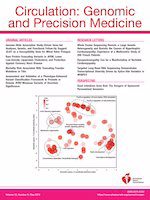
Circulation-Genomic and Precision Medicine
Scope & Guideline
Advancing Precision in Cardiovascular Care
Introduction
Aims and Scopes
- Genomic Insights into Cardiovascular Diseases:
The journal emphasizes the role of genetic factors in cardiovascular diseases, exploring how genetic variations influence disease susceptibility, progression, and treatment outcomes. - Precision Medicine Approaches:
It promotes the application of precision medicine principles, aiming to tailor prevention and treatment strategies based on individual genetic profiles and other biomarkers. - Multidisciplinary Methodologies:
The journal encompasses a wide range of methodologies, including genomics, transcriptomics, proteomics, and metabolomics, to provide a comprehensive understanding of cardiovascular health. - Population Diversity and Health Disparities:
There is a consistent focus on studying diverse populations to understand how genetic and environmental factors contribute to cardiovascular health disparities. - Translational Research:
The journal encourages research that translates findings from the laboratory to clinical settings, emphasizing the practical implications of genomic research in patient care.
Trending and Emerging
- Polygenic Risk Scores and Predictive Analytics:
There is an increasing focus on developing and validating polygenic risk scores to enhance the prediction of cardiovascular diseases, indicating a trend towards integrating genetic data into clinical risk assessment. - Multi-Omic Approaches:
Emerging studies are increasingly utilizing multi-omic approaches, integrating genomics, proteomics, and metabolomics to provide a holistic view of cardiovascular health and disease mechanisms. - Health Disparities and Genomic Diversity:
An upward trend is observed in research addressing health disparities among diverse populations, emphasizing the need for inclusive genomic research that considers ethnic and racial differences. - Gene Therapy and Innovative Treatments:
Research on gene therapy and innovative treatment strategies for inherited cardiovascular conditions is gaining momentum, reflecting advancements in genetic engineering and therapeutic interventions. - Application of Machine Learning in Genomics:
The integration of machine learning techniques to analyze complex genomic data and improve diagnostic accuracy is becoming a significant theme, showcasing the intersection of artificial intelligence and precision medicine.
Declining or Waning
- Traditional Epidemiological Studies:
There has been a noticeable reduction in traditional epidemiological studies focused solely on risk factor associations without integrating genomic data, reflecting a shift towards more comprehensive approaches that combine genetics with clinical and lifestyle factors. - Single-Gene Disorders:
Research centered on single-gene disorders related to cardiovascular diseases is becoming less prominent as the field moves towards understanding polygenic contributions and multifactorial interactions. - Basic Mechanistic Studies:
While basic mechanistic studies are essential, there appears to be a waning interest in studies that do not directly translate into clinical applications or precision medicine approaches.
Similar Journals
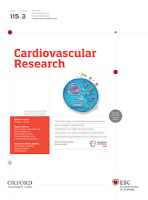
CARDIOVASCULAR RESEARCH
Transforming insights into clinical practice.CARDIOVASCULAR RESEARCH, published by Oxford University Press, is a premier academic journal dedicated to the evolving field of cardiology and cardiovascular medicine. With a remarkable impact factor reflecting its significant contribution to the scientific community, this journal maintains a Q1 ranking in both Cardiology and Physiology categories, demonstrating its commitment to publishing high-quality research that influences clinical practices and healthcare outcomes. Established in 1967, the journal has consistently provided a platform for innovative studies and reviews, aiming to advance our understanding of cardiovascular physiology and pathology. Researchers, professionals, and students will find published articles crucial for their work, as the journal covers a broad spectrum of topics including molecular biology, genetics, and clinical studies. While currently not offering open access options, CARDIOVASCULAR RESEARCH remains accessible through institutional and individual subscriptions, ensuring that the latest findings are available to those in the cardiovascular science community.
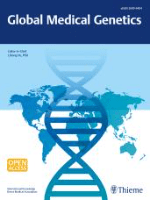
Global Medical Genetics
Fostering Collaboration in Genetic ResearchGlobal Medical Genetics is a premier open-access journal dedicated to advancing the field of medical genetics. Published by GEORG THIEME VERLAG KG, this journal has been providing a dynamic platform for disseminating cutting-edge research and clinical findings since its inception in 2020. With the ISSN 2699-9404, it serves as an essential resource for researchers, healthcare professionals, and students who seek to explore the complex interplay between genetics and medicine. The journal aims to foster collaboration and innovation in the genetics community, addressing a diverse range of topics from genetic disorders to the application of genomics in personalized medicine. By providing open access to its content, Global Medical Genetics enhances knowledge sharing and accelerates advancements in healthcare, making it a vital asset for anyone invested in the future of genetics.
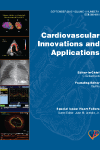
Cardiovascular Innovations and Applications
Unlocking new horizons in cardiovascular health and treatment.Cardiovascular Innovations and Applications is a premier open-access journal dedicated to advancing knowledge in the field of cardiovascular medicine. Published by COMPUSCRIPT since 2016, this journal provides a platform for the dissemination of innovative research and applications that address crucial topics in cardiology, aiming to bridge the gap between clinical practice and cutting-edge research. With an ISSN of 2009-8618 and an E-ISSN of 2009-8782, it operates on a global scale, facilitating access to high-quality content without financial barriers. The journal is positioned within the Medicine - Cardiology and Cardiovascular Medicine category, and its current Scopus rank of #321/387 reflects its potential for growth and influence in the academic community, being in the 17th percentile. Researchers, healthcare professionals, and students will find Cardiovascular Innovations and Applications an invaluable resource in their quest for the latest findings and advancements in cardiovascular health and treatment methodologies.

Genome Medicine
Catalyzing Discoveries in Molecular MedicineGenome Medicine is a prestigious, peer-reviewed journal published by BMC, focusing on the rapidly evolving fields of genetics, molecular biology, and molecular medicine. Established in 2009 and boasting an open-access format, it has become a leading platform for disseminating high-quality research findings that advance our understanding of genetic diseases and therapeutic innovations. With an impressive Q1 ranking across multiple relevant categories—in particular, genetics (clinical), molecular biology, and molecular medicine—this journal is recognized for its substantial impact in the academic community, as evidenced by its exceptional placement in Scopus rankings. By providing unrestricted access to groundbreaking studies, Genome Medicine fosters collaboration and knowledge sharing among researchers, clinicians, and educators, thus playing a vital role in the transition from fundamental genetic research to clinical applications. Researchers are encouraged to contribute their findings and insights, further solidifying the journal’s position as a pivotal resource for those dedicated to advancing genomic medicine.
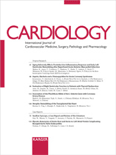
CARDIOLOGY
Pioneering insights in cardiology and cardiovascular medicine.CARDIOLOGY, published by KARGER, is a renowned scholarly journal dedicated to the advancement of research in the fields of cardiology and cardiovascular medicine. Since its inception in 1937, the journal has consistently provided a platform for high-quality, peer-reviewed articles that contribute to the understanding and treatment of heart and vascular diseases. With an impressive convergence through 2024, CARDIOLOGY holds a respectable Q2 ranking in both the Cardiology and Cardiovascular Medicine and Pharmacology (medical) categories, placing it within the 53rd and 45th percentiles of respective Scopus ranks. Based in Switzerland, the journal serves as an essential resource for researchers and practitioners aiming to stay abreast of cutting-edge developments and evidence-based practices in cardiovascular health. While it currently does not offer open access options, its commitment to rigorous scientific standards solidifies its significance within the academic community. We invite readers to explore the latest research findings and contribute to this vital field through publications in CARDIOLOGY.
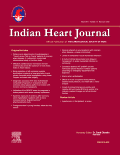
Indian Heart Journal
Elevating Cardiovascular Research to New HeightsIndian Heart Journal, published by Elsevier, is a distinguished peer-reviewed journal dedicated to the field of cardiology and cardiovascular medicine. Founded in 1961, this journal has been a pivotal resource for researchers, healthcare professionals, and students, providing a platform for innovative studies and insights into heart health. The journal transitioned to an Open Access model in 2013, ensuring widespread dissemination of vital research findings to enhance global understanding of cardiovascular diseases. Ranked in the Q3 category for Cardiology and Cardiovascular Medicine in 2023, it holds a reputable position in the medical community, with a Scopus rank of #222 out of 387 journals in the same field, placing it in the 42nd percentile. The Indian Heart Journal strives to foster advances in clinical practice and research while addressing the unique cardiac health challenges faced in India and beyond.

Annual Review of Genomics and Human Genetics
Synthesis of Knowledge: The Pinnacle of Genomic ResearchAnnual Review of Genomics and Human Genetics, published by ANNUAL REVIEWS, represents a pivotal platform in the field of Genetics and Molecular Biology. With an impressive impact factor reflecting its high citation rate and scholarly influence, this journal is renowned for its authoritative reviews that synthesize current research across genomics and human genetics. Highlighting its Q1 category rankings in both Genetics and Clinical Genetics, as well as its ranking within the top tiers of Biochemistry and Genetics, the journal stands out as a leading resource for researchers, professionals, and students eager to stay abreast of groundbreaking developments in these rapidly evolving fields. While not currently an open access journal, its rigorous peer-review process ensures the highest standards of scientific integrity. Researchers can access comprehensive reviews that delve into both fundamental genetics concepts and cutting-edge discoveries, making it an essential resource for advancing understanding in human genetics and its applications.
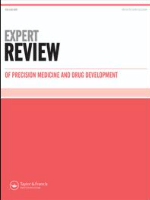
Expert Review of Precision Medicine and Drug Development
Advancing drug development through precision insights.Expert Review of Precision Medicine and Drug Development, published by Taylor & Francis Ltd, is a valuable academic resource that thrives at the intersection of pharmacology, genetics, and molecular medicine. Since its inception in 2016, this journal has rapidly become a pivotal platform for researchers and practitioners aiming to advance the field of drug development through innovative precision medicine strategies. With a broad focus encompassing the latest advancements in drug discovery and genetic research, it operates within a competitive landscape, evidenced by its recent category quartile rankings where it holds Q4 in Drug Discovery, Genetics, and Molecular Medicine, alongside a Q3 ranking in Pharmacology for the year 2023. The journal offers a unique opportunity for scholars to share insights and foster collaborations that can lead to breakthroughs in therapeutic approaches. Although not an open-access journal, it maintains a commitment to disseminating outstanding research to a wide audience. By fostering a rigorous peer-review process, the journal aims to enhance the quality and impact of publications within these critical areas of medicine, making it an essential read for anyone involved in healthcare and pharmaceutical advancements.

Journal of the American Heart Association
Empowering Cardiologists with Cutting-Edge DiscoveriesThe Journal of the American Heart Association, published by WILEY, serves as a premier platform for advancing cardiovascular medicine through its commitment to open access, fostering global dissemination of cutting-edge research since 2012. It proudly holds a prestigious position within the top quartile (Q1) in the categories of Cardiology and Cardiovascular Medicine, as evidenced by its Scopus ranking of #49 out of 387 journals, placing it in the 87th percentile. With a focus on innovative studies and transformative findings, this journal is essential for cardiologists, researchers, and healthcare professionals seeking to stay at the forefront of cardiovascular knowledge. The journal aims to bridge the gap between basic science and clinical practice, presenting findings that shape the future of heart health treatment and prevention. As a resource for academic and clinical communities alike, the Journal of the American Heart Association is dedicated to enhancing the understanding and treatment of cardiovascular diseases globally.

Current Genetic Medicine Reports
Connecting Researchers and Practitioners in GeneticsCurrent Genetic Medicine Reports, published by SPRINGERNATURE, is a prominent journal dedicated to advancing the field of genetic medicine. With an emphasis on the latest research and advancements, this journal serves as a critical platform for disseminating high-quality original articles, reviews, and reports that focus on the application of genetic information in various medical disciplines. As an open-access journal, it ensures that valuable findings are freely accessible to a global audience, thereby fostering collaboration and innovation among researchers, healthcare professionals, and students alike. Although the journal does not yet have an established impact factor, its commitment to rigorous peer review and its contributions to the understanding and integration of genetic medicine into clinical practice enhance its scholarly significance. The editorial board is comprised of leading experts, encouraging submissions that tackle contemporary issues in genetic research and its clinical applications. Located in London, England, this journal is poised to be a vital resource for those seeking to stay abreast of the rapid changes in the dynamic field of genetic medicine.